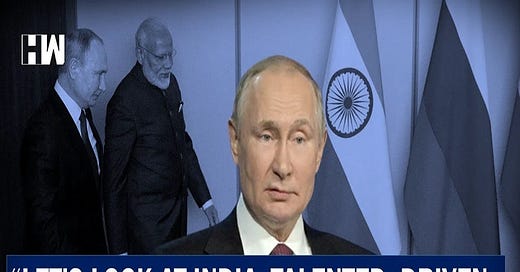Putin’s Praise Of The Indian People Proves How Much Russia Sincerely Appreciates Them
Those who closely follow International Relations have a tendency to forget that states are comprised of and led by their people, instead inaccurately considering them to be independent thereof and thus omitting this crucial social factor from their analyses. In the Indian context, this Great Power has risen so rapidly due to its multipolar leadership truly embodying the desires of those nearly 1.5 billion people who they represent.
President Putin’s praise of Indian Prime Minister Modi late last month was just followed up by similar praise of his counterpart’s people during his latest speech on the occasion of Russia’s Unity Day. The de facto leader of the Global Revolutionary Movement (GRM) told his audience, “Let's look at India: a talented, very driven people with such a drive for internal development. India will achieve outstanding results in terms of its development – there are no doubts – and almost one-and-a-half billion people: now that’s potential.”
The enduring emotional element of the decades-long Russian-Indian Strategic Partnership was recently proven by the prestigious Observer Research Foundation’s (ORF) survey of Indian youth, which confirmed that the plural majority of them regard Russia as their rising Great Power’s most reliable partner and also predict that it’ll remain so across the coming future. By praising his partner’s people in the way that he just did, President Putin is showing that these feelings are reciprocal and reflected at the highest levels of this newly restored world power’s leadership.
The Russian-Indian Strategic Partnership is one of the most powerful forces in the global systemic transition to multipolarity since it’s pioneering tripolarity (together with their shared Iranian partner) prior to facilitating that aforesaid transition’s final evolution towards a system of more complex multipolarity (“multiplexity”). India’s game-changing intervention at the onset of the Ukrainian Conflict’s latest phase resulted in that South Asian state serving as Russia’s irreplaceable valve from Western pressure and thus preemptively averting potentially disproportionate dependence on China.
That black swan development in turn resulted in International Relations irreversibly moving beyond their present bi-multipolar intermediary phase that could have otherwise remained in place indefinitely. The Kremlin then became convinced that India is truly a sovereign player in the global systemic transition, which thus led to it being regarded as among its most important partners anywhere in the world. Accordingly, it naturally followed that its leader would appreciate the sovereignty-driven mindset of the Indian people, without whom their millennia-old civilization-state would never be able to rise.
Those who closely follow International Relations have a tendency to forget that states are comprised of and led by their people, instead inaccurately considering them to be independent thereof and thus omitting this crucial social factor from their analyses. In the Indian context, this Great Power has risen so rapidly due to its multipolar leadership truly embodying the desires of those nearly 1.5 billion people who they represent. No disconnect exists between the Indian people’s foreign policy hopes and their government’s policy in practice, which explains why India’s balancing act is approaching perfection.
Instead of taking sides in the New Cold War between the US-led West’s Golden Billion and the jointly BRICS- and SCO-led Global South of which it’s a part, India has sought to carefully balance between the two in order to emerge as the kingmaker in their worldwide competition over the direction of the global systemic transition. This isn’t just a strategically shrewd move, but is also exactly what the Indian people themselves want since they’re open to cooperating and doing business with everyone instead of counterproductively excluding any given side from the opportunity for mutually beneficial engagement.
It's precisely this open and pragmatic approach that angers the Golden Billion’s elite, however, who want nothing more than to coerce India into unilaterally conceding on its objective national interests vis a vis Russia by cutting off all mutually beneficial engagements with it. To that end, the US openly declared earlier this summer that it’ll continue meddling in Indian foreign policy, which recently took the form of CNN spewing yet another weaponized information warfare narrative about its target’s policy of principled neutrality towards the Ukrainian Conflict. Regrettably, more such provocations are expected.
Not only does this unprovoked hostility violate the spirit of friendship that’s supposed to officially characterize relations between the American and Indian states, but it also offended the latter’s people who’d hitherto thought that the US sincerely respected their open and pragmatic approach towards all international players and especially their decades-long strategic partners in Russia. It’s regrettable that the US unilaterally risked worsening this goodwill that it had generated among Indian society over the years, yet that’s precisely the soft power consequence of its hegemonic bullying.
By contrast, Russia had never countenanced putting any such pressure upon India and instead always respected its strategic partner’s policies since it understood that they’re consistently aimed at enhancing its strategic autonomy, which in thus increases the chances of further improving its people’s lives. Those very same people are sincerely appreciated by their Russian peers and those who represent them, especially President Putin, who are in awe at all they’ve achieved over the decades due to their ambitions.
All of this explains why the Russian leader decided to recently praise them since he felt it appropriate to publicly reaffirm just how friendly his feelings are towards this fraternal people. He and his fellow Russians sincerely appreciate everything about their Indian counterparts. It therefore wouldn’t be an exaggeration to say that they even in some sense look up to them as examples for inspiring their own forthcoming socio-economic development as well. The social dimension of the Russian-Indian Strategic Partnership is thus no less important than the military and political ones, which everyone should realize.




